Hugo Broos will walk away from Bafana Bafana after the 2026 FIFA World Cup, leaving behind a team reborn — confident, disciplined, and competitive on the continent once again.
But as his farewell draws near, the burning question emerges: should his successor be South African or European?

It’s a debate that could divide opinion across the football fraternity, from the corridors of SAFA House to the voices of fans in the stands.
On one hand, Broos’ reign has proved that a strong, independent-minded European coach can restore structure and belief.
His methods were unconventional — even unpopular at times — but his stubborn faith in his process delivered results. A World Cup qualification, an AFCON bronze, and a renewed sense of national pride are not minor achievements.
A European successor could build on that foundation — bringing continuity in discipline, tactical organisation, and the ability to keep players accountable.
There’s also the perception that foreign coaches command instant respect from players, simply because they come from football systems that are seen as more advanced.
But does that mean South African coaches aren’t ready?
That argument is becoming increasingly hard to justify. Coaches like Rulani Mokwena, Pitso Mosimane and Manqoba Mngqithi have shown tactical depth and an understanding of the local game that few outsiders can match.
They know the culture, the players, and the invisible nuances that shape South African football identity.
A local coach could also reconnect Bafana to its emotional roots — something Broos, despite his success, never truly embodied. South African football is expressive, unpredictable, and rich in flair.
A local coach might find the right balance between discipline and freedom, allowing the team to play with identity as well as structure.
Then there’s the question of legacy. Should Bafana always rely on a foreign mind to succeed? Or is it time to trust one of our own to take the next step?
Broos himself may have set the standard, but he also created the platform for a local coach to thrive.
He instilled belief in the system again — the kind of belief that can allow a South African tactician to step in and evolve it further rather than rebuild from scratch.
In the end, perhaps it’s not just about the passport, but the plan. Whoever takes over must carry the courage to continue Broos’ work — to challenge comfort, demand excellence, and think long-term.
Still, one thing’s certain: after 2026, the next Bafana coach will inherit not a broken project, but a winning one.
Whether it’s a European visionary or a local pioneer who continues that journey could define the next decade of South African football.
So, who should it be — another outsider to refine the revolution, or a homegrown mind to own it? The conversation starts now.
